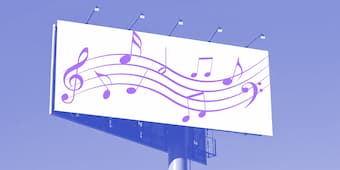
© Contently
Have you ever heard any advertisement music on the radio and TV that sounds familiar to you? A lot of them are excerpts or adaptations from classical music. I am going to share with you ten pieces that have been used in advertisements from all over the world.
Gioachino Rossini’s William Tell Overture
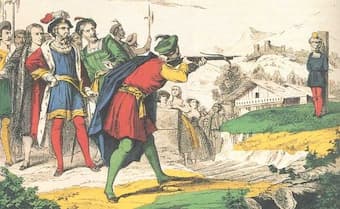
Guillaume Tell © dinosoria.com
Composed by Gioachino Rossini (1792-1868), William Tell Overture is frequently used in advertisements and commercials. It was the last opera that Rossini wrote and perhaps one of the most popular among his 39 operas. It is the overture to the opera Guillaume Tell, and it consists of four continuous movements. The last part of the overture was particularly popular. It was taken as the theme music in a TV drama The Lone Ranger and since then it is always associated with horse-riding. Hong Kong Jockey Club used this theme for quite some years but this theme is also featured in a commercial which is unrelated to horse-riding:
Richard Wagner’s Ride Of The Valkyries
One of the best-known pieces by Richard Wagner (1813-1883), Ride Of The Valkyries is the opening of Die Walküre (The Valkyrie), the second opera of the Ring Cycle. The story of this opera is based on a Norse mythology, and the title character, Valkyrie Brünnhilde, carries some supernatural power. In the opera, “The Ride Of The Valkyries” plays when the Valkyries, warrior maidens ride back from a battle.
But here is one of the commercials with the use of this theme:
Léo Delibes’ The Flower Duet
The Flower Duet is a piece in the first act of Léo Delibes‘ opera Lakmé (1883). It is a duet for soprano and mezzo-soprano, and it is sung by Lakmé and her servant Mallika when they are getting some flowers by a river.
This duet is a popular concert piece, and it has been used frequently in advertisements and films.
Here are two different advertisements using this work:
Léo Delibes (1836-1891) was a French Romantic composer. His best-known works include this opera and his ballets Coppélia (1870) and Sylvia (1876).
Wolfgang Amadeus Mozart’s Queen of the Night Aria
It is not difficult to find Mozart’s works on TV commercials. This work, Queen of the Night aria, is one of the most famous arias of all time. It is an aria in the second act of Mozart’s opera The Magic Flute (Die Zauberflöte).
Richard Strauss’ Also Sprach Zarathustra
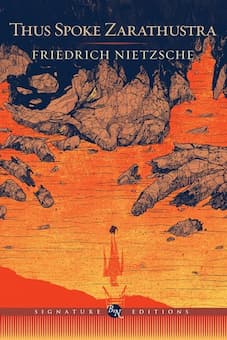
Friedrich Nietzsche’s Thus Spoke Zarathustra © Rakuten Kobo Inc.
Another popular repertoire used in TV commercials and TV dramas and films is Sprach Zarathustra by Richard Strauss (1864-1949). This tone poem has nine sections and is based on Friedrich Nietzsche’s novel Thus Spoke Zarathustra. Each section is named after the title of the selected chapter of the book. While Zarathustra’s philosophical journey in the novel inspired Strauss creating this influential work, this commercial doesn’t seem very philosophical at all:
Pietro Mascagni’s Intermezzo from Cavalleria Rusticana
Composed by Italian composer Pietro Mascagni (1863-1945), Cavalleria Rusticana is considered one of his masterpieces and classic verismo operas. Mascagni wrote this piece for a competition held by Milanese music publisher Edoardo Sonzogno in 1888. He spent less than two months; he submitted it on the last day of the competition’s deadline, and he won! This opera is based on Giovanna Verga’s novel about a passionate love tragedy. The sentimental melody suits this commercial very well:
Gioachino Rossini’s Overture from La Gazza Ladra (The Thieving Magpie)
Gioachino Rossini (1792-1868) wrote this two-act opera La Gazza Ladra (The Thieving Magpie) based on an 1815 comedy La Pie Voleuse by JMT Badouin d’Aubigny and Louis-Charles Caigniez. The story is about discovering a magpie that had been stealing a silver spoon and hiding it in its nest. This overture has been used quite often for television and radio advertisements, including this award-winning one:
Johann Pachelbel’s Canon in D
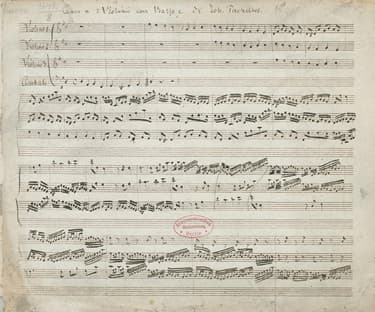
The first page of the oldest surviving copy of Johann Pachelbel’s “Canon and Gigue in D major.”
The popularity of Canon in D has made its frequent use in tv commercials no surprise. Written by the German Baroque composer Johann Pachelbel (1653-1706), this piece is part of his Canon and Gigue for three violins and basso continuo. It was written in D major, but it has been transposed to different keys for various occasions. Let’s watch how this music is used in this Thai’s commercial:
Georges Bizet’s L’amour est un oiseau rebelle (Habanera) from Carmen
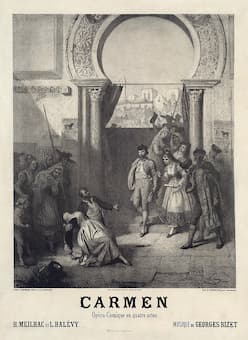
Poster for the premiere of Georges Bizet’s Carmen
Nicknamed Habanera, L’amour est un oiseau rebelle belongs to the first act of Bizet’s opéra comique Carmen (1875). Georges Bizet (1838-1875) actually did not compose the tune of this aria, but he adapted it from “El Arreglito ou la Promesse de marriage” by the Spanish musician Sebastián Iradier. However, Bizet rewrote it and made it one of the most recognizable arias of all time. The tune has been adapted in popular songs, films, and tv commercials such as this one:
Ludwig van Beethoven’s Symphony No. 5
A lot of Beethoven‘s music were used frequently in commercials, including his famous Symphony No. 5:
Classical music has a timeless popularity. It can produce a wide range of emotions and atmospheres that make it perfect for use in all kinds of medias such as video games, movies, tv dramas, podcasts…you name it! While some classical compositions contain their own stories, the imagination is the only true limit to the stories this music can tell.
For more of the best in classical music, sign up for our E-Newsletter



What is the piano &violin piece played in the ASPCA commercial?
Does anyone know the classical piece in the current Motorpoint advert?
Hello, can anyone tell me the the name of the music that accompanies the direct bullion ad on tv
dave
What is the title of the opening music used in Beautiful music for a crazy world used on classical F M .ca as seen on tv advrtisment
I am not sure of the advert but a beautiful aria maybe but Maria callas can you help